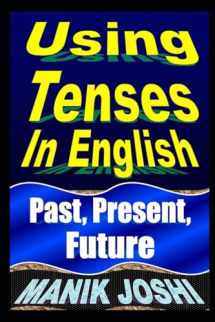
Using Tenses In English: Past, Present, Future (English Daily Use)
ISBN-13:
9781492743095
ISBN-10:
1492743097
Author:
Mr. Manik Joshi
Publication date:
2013
Publisher:
CreateSpace Independent Publishing Platform
Format:
Paperback
100 pages
Category:
Words, Language & Grammar
FREE US shipping
Book details
ISBN-13:
9781492743095
ISBN-10:
1492743097
Author:
Mr. Manik Joshi
Publication date:
2013
Publisher:
CreateSpace Independent Publishing Platform
Format:
Paperback
100 pages
Category:
Words, Language & Grammar
Summary
Using Tenses In English: Past, Present, Future (English Daily Use) (ISBN-13: 9781492743095 and ISBN-10: 1492743097), written by authors
Mr. Manik Joshi, was published by CreateSpace Independent Publishing Platform in 2013.
With an overall rating of 3.9 stars, it's a notable title among other
Words, Language & Grammar
books. You can easily purchase or rent Using Tenses In English: Past, Present, Future (English Daily Use) (Paperback) from BooksRun,
along with many other new and used
Words, Language & Grammar
books
and textbooks.
And, if you're looking to sell your copy, our current buyback offer is $0.3.
Description
This Book Covers The Following Topics: What are "Tenses"?AGREEMENT between SUBJECT and VERBTWENTY-FOUR Auxiliary VerbsREGULAR AND IRREGULAR VERBSPRESENT TENSEPresent Indefinite TensePresent Continuous/Progressive TensePresent Perfect TensePresent Perfect Continuous/Progressive TensePAST TENSEPast Indefinite TensePast Continuous/Progressive TensePast Perfect TensePast Perfect Continuous/Progressive TenseFUTURE TENSEFuture Indefinite TenseFuture Continuous/Progressive TenseFuture Perfect TenseFuture Perfect Continuous/Progressive TenseUseful NotesExercisesSample This:Tenses could be defined as "any of the form of a verb that may be used to show thetime of the action or an event or state expressed by the verb".THERE ARE THREE KINDS OF TENSES:The Past Tense - The form of a verb that usually expresses an action that happened in the past[Action happened before present]The Present Tense - The form of a verb that usually expresses an action that happens at this time[Action happens in present]The Future Tense - The form of a verb that usually expresses an action that will happen in future[Action will happen after present]EACH OF THESE THREE KINDS OF SENTENCES HAS FOUR TYPES OF FORMS:Indefinite or Simple FormContinuous or Progressive FormPerfect FormPerfect Continuous or Perfect Progressive FormEACH OF THESE FOUR TYPES OF FORMS HAS FOUR KINDS OF STATEMENTS:Affirmative Statement --Used to Show 'Agreement'Negative Statement --Used to Show 'Disagreement'Interrogative Statement --Used to Ask 'Question'Interrogative-Negative Statement --Used to Ask 'Question' and Show 'Disagreement'Present Indefinite TenseExpresses -Permanent situation [in the past, present and future]Example: Our family lives in Seattle.General truth (fact or statement)Example: Clean water is fundamental to public health.Example: Many barrages have no utility and causes floods.Habitual action [actions that occurs regularly]Example: She listens to music every day.'Future meaning' (timetable, planned event, etc.)Example: My shop closes at 9pm.Example: The train arrives at 7:30pm.Traditions, rituals, customsExample: Indians celebrate festival of light in the month of Oct-Nov.Commands and Instructions [Imperative Sentences][Note: In imperatives, subject 'you' remains hidden]Example: Condemn perpetrators of terrorism.Example: Promote values of humanity and tolerance.Example: Tell us about the exact nature of your work.Used in if-clause of present and future real conditional sentencesExample: If I go there, I meet him.Example: If things don't work out, we won't be panicked.Headlines in news reporting [Use of simple present tense instead of simple past tense is common in news headlines]Example: Flight skids on landing at airport.Example: Thunder storm brings relief to residents.(A). AFFIRMATIVE PATTERN -subject + first form of main verb + other wordsSingular Verb is used with subject 'He and She' + All Singular Subjects.Plural Verb is used with subject 'I, We, You and They' + All Plural Subjects.Examples:He/She talks. I/We/You/They talk.We seek opportunity to chart out our own course.Lean margin of victory or defeat gives an impression of a tough contest.Nowadays, voters value development over other issues.They want civic amenities and employment opportunities.(B). NEGATIVE PATTERN -subject + auxiliary verb 'do/does' + not + first form of main verb + other wordsAuxiliary Verb 'Does' is used with subject 'He and She' + All Singular Subjects.Auxiliary Verb 'Do' is used with subject 'I, We, You and They' + All Plural Subjects.Examples:He/She does not talk. I/We/You/They do not talk.Most buses do not cater to interior parts of the villages.He does not know what to say.


We would LOVE it if you could help us and other readers by reviewing the book
Book review

Congratulations! We have received your book review.
{user}
{createdAt}
by {truncated_author}


